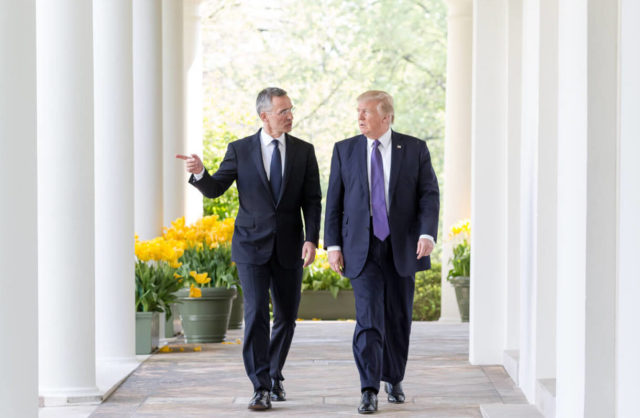
The current murmurings of friction between the Trump administration and European leaders, including with German Chancellor Angela Merkel, appear to threaten the cohesion of the West as we know it. Despite smiles during the Trump-Macron summit in Paris, the key U.S. relationship in the Old Continent – with Germany – is in trouble. And while the special relationship with Great Britain remains intact, London is so preoccupied with Brexit and its divorce from the EU that its role as a European power will be greatly reduced for years. Nevertheless, the United States needs its European allies as rifts with Russia are growing fast and appear unbridgeable.
Consider this. The 100 kiloton nuclear weapon test by North Korea further escalates tensions on the Korean Peninsula, making this the most fraught Weapons of Mass Destruction (WMD) confrontation since the 1962 Cuban missile crisis and the 1973 Yom Kippur War nuclear high alert between the USSR and the U.S. Beijing and Moscow are wringing their hands, while potentially manipulating the situation to the detriment of Washington.
Russia: Proliferation Policy
Missile technology transfer from Moscow to Pyongyang is well documented, as is Iranian funding for Kim Jong-un’s WMD program and proliferation to the worst regimes, including Bashar al-Asad’s Syria. The plutonium nuclear reactor, built for one purpose only – to build the Syrian, Alawite A-bomb against Israel – was funded by Teheran, but designed in Pyongyang.
When the latest North Korean test took place, Vladimir Putin was on his way to Beijing for the fifth meeting this year with President Xi Jinping. Before that, he published an article effectively defending North Korea, and essentially called on Washington to refrain from “intimidation” of Pyongyang. Putin is against sanctions and against use of force, forcing Washington effectively to admit a defeat.
Putin has reversed decades of Soviet and Russian foreign policy and the international consensus of great powers by supporting Kim, a malignant proliferator who is threatening a nuclear war and is already selling nuclear weapons technology to failing regimes including Asad’s. China has repeated platitudes about a “nuclear-free zone” on the Korean Peninsula, and called for the implementation of the Sino-Russian Plan for de-escalation, effectively playing in tandem with Russia and opposing Washington.
The fast pace of North Korea’s atomic fission or possibly even hydrogen fusion bomb development, as well as missile technology advancement, suggests massive foreign technological, and possibly, financial support. To establish which countries could be participating in that is the urgent task for the U.S., South Korean, Japanese, and Western intelligence communities.
If China and/or Russia have participated in activities supporting North Korean nuclear weapons and missile development, it would mean that North Korea is jointly being used by China and Russia as a battering ram to provoke the United Sates, suggesting further escalation.
Washington needs to advise China and Russia that it may not succeed in preventing Japan and South Korea from developing their own nuclear and missile arsenals for their militaries. Tokyo and Seoul are also likely to vastly expand their missile defense forces. The long-term implications of the current crisis may actually affect Russia and China’s security negatively, increasing long-term instability in the Northern Pacific.
It bodes ill for the United States that Russia has become the anti-status quo power of the 21st century, while China looms behind it. Moscow’s resentment, jealously, and ill will is there for all to see.
Pulling the Allies Apart
On issues close to its heart: climate and trade, Europe sided defacto with China, which quickly is fashioning itself – surprise – as a proponent of free trade, and fighting carbon emissions. The United States of course, is retreating into the cocoon of economic protectionism and leaving the Paris Climate Accords. The developing rift does not serve America’s – or Europe’s – interests. Both sides need to reverse the negativity before it is too late. America’s peer competitors, Russia and China, and the global Islamist terror movement will be the only beneficiaries of an intra-Western quarrel.
The centripetal forces of the West – the ultra-nationalist Marine Le Pen in France, or the extreme anti-Semitic left in British Labor, or Central European conservative populists – could spell geo-strategic, economic and systemic disaster. U.S. and European national leaders need to carefully define and resolve differences over security and trade, not turn them into political fodder for isolationist movements.
For over 200 years, the United States has gravitated toward Europe. In the early nineteenth century, the then-young United States began its integration into the Euro-Atlantic sphere, starting with the Louisiana Purchase and the Barbary Wars fought by the U.S. Navy. America defeated imperial Spain (1898), and the Kaiser’s Germany (1917-1918), and then played a key role in Europe’s post-World War I reinvention, thereby bringing American power and business to Europe.
Victory in World War II made America the leading superpower, supplanting the British Empire and confronting Stalin’s Soviet Union. Then, victory in the Cold War created a unipolar moment for Washington that is now over.
Present and future conflicts involve radical Islamist movements, which this year alone reaped harvests of blood in Berlin, London, and Barcelona, but the global threats extend beyond terrorist groups. After a decade of post-imperial shock, Russia, like the USSR before it, has returned to an anti-status quo posture in Europe. One can only hope that China’s economic expansion will remain peaceful for decades to come.
In the past, the Marshall Plan and the establishment of NATO built Euro-Atlantic unity. This alliance was borne not just of shared values, but also of necessity: the Europeans needed not only America’s protection from the USSR but American leadership – and markets.
Today, however, forces on both sides of the Atlantic threaten the two-century old ties. First, demographic shifts have resulted in a American population that increasingly lacks historical ties to the Old Continent. In fact, Barack Obama was the first American president barely interested in Europe, despite his wild popularity there. Donald Trump may not be interested for different reasons.
Trump’s demands to balance NATO burden sharing, rectify trade deficits, especially with Germany, and his decision to quit the non-binding Paris Accords, may be justified in policy terms. However, the execution, at times in tweets and jarring public statements unnecessarily have called in question U.S. commitments to the Trans-Atlantic Alliance. Clearly, Germany and other European powers need to provide a much greater contribution to the Alliance. However, both sides have abiding national interests in managing and resolving the current disagreements and contain Russia – together.
Together: History and the Future
We live in an unbelievably rich, free, and thriving community, in which the Northern Atlantic is reminiscent of Mare Nostrum (“Our Sea”) in the Greek- and Roman-led civilization of the fifth century BCE through the fourth century AD.
Great Britain and the United States have in the past dispatched Spanish, Dutch, German, and Soviet contenders for Atlantic hegemony to the dustbin of history.
The collective West is based on Judeo-Christian values, Greek philosophy, Anglo-Saxon common law – or Roman law in Europe – the Protestant work ethic and democratic principles of the Founding Fathers – an astounding achievement of more than 2,500 years of human civilization.
It would be shortsighted to focus on the negative, highlight disagreements, and allow ties to fray. Instead, the United States and the European allies need to pursue closer cooperation in three vital areas.
First, defense and security: Europe needs to take more responsibility in deterring Russia. Germany has begun the painful process of transforming into a core nation for European defense. Challenged in the Middle East and in the Pacific, including by North Korea, the United States cannot continue paying over 70 percent of NATO expenses while Europe thrives.
The question is, whether more than 70 years after the fall of the Third Reich, and lacking Prussian militarism and a hegemonic ideology, can Germany carry Europe’s security on its shoulders, supported by the French Force de Frappe (nuclear deterrent), and British naval power and its own nuclear arsenal.
Nations of Eastern and Central Europe, and especially NATO members, cannot face Russia alone. However, NATO needs to evolve into a more equitable burden-sharing organization, which keeps Russia’s ambitions in check, from the Baltic to the Black Sea. It also should be attracting the neutral Nordic countries, Sweden and Finland, into its ranks.
Second, Europe also must coordinate closely its anti-terror and immigration policies, making its maritime borders impenetrable, and its security services and police more integrated, interoperable, and proactive.
Third, European and American leaders must collaborate to resolve trade disputes so that current imbalances even out and the U.S. gains jobs. Germany can increase its military acquisitions in the United States, thus strengthening German defenses.
Finally, on the climate debate we should agree to disagree. America is a leader in environmental technologies, and has not increased CO2 emissions for three years, due to higher shale gas consumption and growth in renewable energy. If the Paris Accords had been brought to the Senate as a treaty, ratification would have failed.
Leaders on both sides of the Atlantic have to recognize the treasure with which they are entrusted: a community of free nations. Their duty and responsibility is to preserve it and make it stronger – not to waste time on destructive squabbles – and to defeat the Russian challenge.
Ariel Cohen, Ph.D., is Senior Fellow at the Atlantic Council, and Director, Center for Energy, Natural Resources and Geopolitics at the Institute for the Analysis of Global Security.





